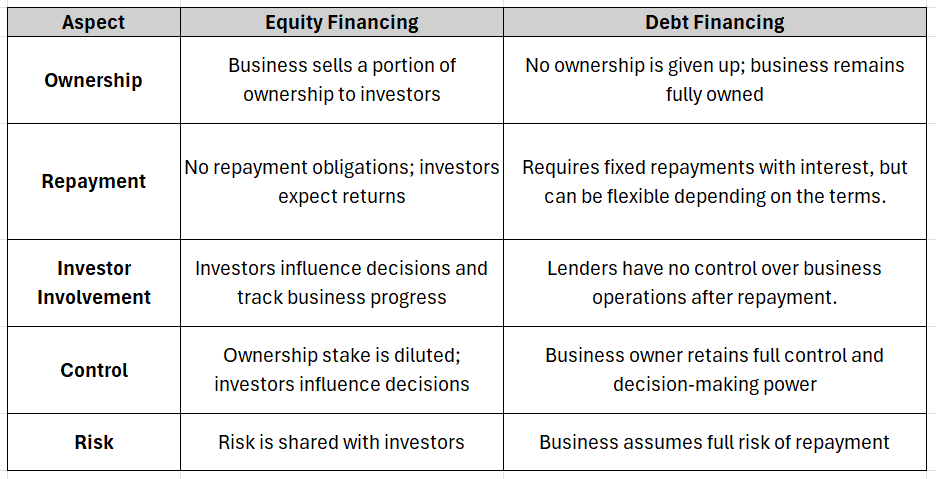What is SME Equity Financing? Understanding the Key Benefits for Small Businesses

As an SME, finding the right funding can be tough. Loans can feel restrictive, and securing capital on your own can take time. SME equity financing gives you a different route. Plus, investors often bring more than money; they bring expertise and networks that can help drive your success.
In this article, we'll explore why SME equity financing could be the key to opening your business's potential, its benefits, and how it stacks up against debt financing. Let’s dive in!
Key Takeaways:
- What it is: Raise capital by selling ownership to investors (angels, VCs, PE). No EMIs; investors win when you win.
- Why it helps: Frees up cash flow, brings expertise, credibility, and networks.
- Trade-offs: Dilution, board/rights for investors, pressure to scale.
- Alternatives: Venture debt, revenue-based financing (RBF), working-capital lines—increase runway without giving up ownership.
What is SME Equity Financing?
SME equity financing allows businesses to raise capital by selling ownership stakes to investors. In exchange for funds, investors gain shares in the company, becoming partial owners.
This method offers funding without the need for repayment, making it ideal for businesses focused on growth. The amount of equity offered depends on the business value and capital required.
Also Read: Equity Capital Explained Types, Examples & When to Use It Over Debt
How SME Equity Financing Works
- Define use of funds: Map out how capital will be deployed, the milestones to achieve, and the key metrics for the next raise or exit.
- Valuation & dilution modelling: Align on pre‑ and post‑money valuation and option‑pool sizing.
- Term sheet: Covers economics such as valuation and liquidation preference, and control terms such as board seats and reserved matters.
- Diligence: Includes financial, legal, tech, and customer reference checks.
- Definitive docs & close: Final agreements, regulatory filings, tranche conditions, and first disbursal.
Indicative timeline: 6–12+ weeks depending on company readiness and investor conviction.
Benefits of SME Equity Financing
- No Repayment Pressure: Unlike loans, equity financing doesn’t require monthly repayments, freeing up cash flow for reinvestment into your business.
- Expertise and Connections: Investors often offer strategic guidance and valuable industry connections that can help you scale faster.
- Increased Credibility: Having well-known investors boosts your business’s credibility, making it easier to secure customers, partners, and future funding.
- Risk Sharing: Investors share the financial risk, unlike debt financing, where the business shoulders the entire burden.
- Aligned Growth Focus: Investors are invested in your long-term success, providing the capital and support needed for high growth.
Considerations & Trade‑offs
- Dilution & control: Equity reduces ownership; major decisions like acquisitions or new debt often need investor approval.
- Growth expectations: Investors target 3–5x returns, driving aggressive growth and time‑bound exit pressure.
- Process intensity: Heavy diligence upfront, followed by strict reporting and regular board oversight.
Types of Equity Financing Available for SMEs
- Angel Investors: Individual investors who provide early-stage capital in exchange for equity. They typically invest smaller amounts but offer valuable guidance and mentorship.
- Venture Capital (VC): Investment firms that provide large funding rounds for high-growth SMEs. In return, they take equity stakes and often require a more hands-on role in business decisions.
- Private Equity (PE): Firms that invest in more established businesses. They often take larger stakes and focus on scaling, restructuring, or acquiring companies to increase profitability.
- Crowdfunding: Platforms where businesses can raise small amounts of capital from many individual investors in exchange for equity or rewards.
Also Read: Guide to Understanding Debt Financing for Startups
Equity Financing vs Debt Financing

If you're considering debt financing as a viable solution, Recur Club offers a trusted debt marketplace that provides a seamless alternative to equity financing. With over 15+ credit structures, competitive interest rates, and customizable repayment options, we offer fast, flexible, and tailored solutions for your business.
Whether it’s working capital loans, revenue-based financing (RBF), lines of credit, equipment finance, or invoice discounting or something else, Recur Club is here to support your growth with the right capital, on your terms.
Conclusion
Choosing the right financing method is crucial for any SME. While equity financing helps you raise capital without the pressure of repayments, debt financing offers flexibility with competitive interest rates and customizable repayment terms, all while allowing you to maintain full control of your business.
At Recur Club, we’ve disbursed over ₹2500+ crores in capital to startups, SMEs, and high-growth businesses across various sectors, including D2C, SaaS, tech, and subscription-based models.
With access to over 150+ bespoke lenders, including major names like Tata Capital and Incred, we offer flexible and tailored financing solutions to help your business grow.
What Else?
- 98% Customer satisfaction rate
- Complete pricing transparency
- Dedicated expert advisory
Sign up now or talk to an expert to discover the perfect financing solution for your business.
FAQs
Q1. How much equity should I give up?
It depends on how much capital you need and your business valuation. Early-stage businesses often offer more equity due to higher risk and lower valuation.
Q2. Will I lose control of my company?
Not necessarily. While investors gain a say in major decisions, many deals are structured to preserve founder control, especially with minority investors like angel groups or VCs.
Q3. How long does it take to raise equity financing?
It can take anywhere from a few weeks to several months, depending on investor interest, due diligence, and deal complexity.
Q4. Can I mix equity and debt financing?
Absolutely. Many businesses use a blend of both to balance ownership retention with flexible funding.
Q5. What do investors look for in SMEs?
They focus on strong leadership, a scalable business model, traction in the market, and a clear growth plan.


.png)
.jpg)

.jpg)